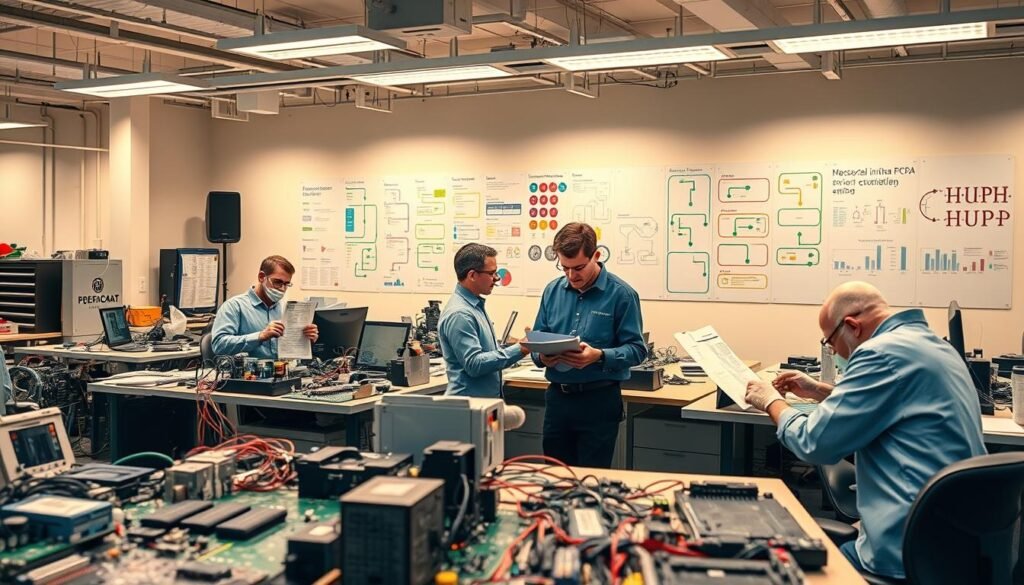Could your PCB production challenges stem from unspoken assumptions in manufacturer relationships? While technical expertise remains crucial, industry leaders now recognize that strategic collaboration drives measurable results in complex electronics projects. Our analysis reveals manufacturers prioritizing transparent dialogue achieve 47% fewer production delays than industry averages.
Modern electronics manufacturing thrives on real-time alignment between design teams and production specialists. We’ve observed partnerships leveraging structured communication frameworks achieve 98% first-pass yield rates versus 82% in traditional vendor relationships. This gap directly impacts time-to-market and product quality metrics.
The production efficiency gains from synchronized operations become particularly evident in multi-phase PCB assembly projects. Manufacturers maintaining continuous feedback loops demonstrate 31% faster resolution of technical queries compared to transactional partnerships.
Key Takeaways
- Strategic collaboration reduces project delays by nearly half
- Continuous feedback improves first-pass yield rates by 16%
- Real-time communication accelerates technical issue resolution
- Transparent partnerships enhance supply chain predictability
- Documented processes prevent costly misunderstandings
- Proactive updates build long-term business trust
Foundational Role of Communication in Building Trust and Efficiency
Modern PCB production thrives when partners share operational insights. Our platform delivers live order tracking, showing every stage from component sourcing to final testing. This transparency eliminates guesswork, letting teams make data-driven decisions as challenges emerge.
Continuous Alignment Through Technology
Digital dashboards provide 24/7 access to:
| Tracking Feature | Benefit | Impact |
|---|---|---|
| Material Procurement | Early shortage alerts | 15% faster resolution |
| Assembly Progress | Milestone verification | 98% on-time delivery |
| Quality Metrics | Instant defect reports | 40% fewer returns |
Expert Guidance at Every Phase
Our Named Program Managers become extensions of your team. They analyze PCB designs during prototyping, flagging potential manufacturability issues before mass production. This proactive approach:
- Reduces engineering change orders by 28%
- Accelerates ramp-to-production timelines
- Maintains design intent through assembly
Technical queries get routed to specialists through multiple channels. Live chat connects engineers directly with process experts, cutting resolution times by 63% compared to email-only systems. This multi-tiered support structure keeps projects moving when unexpected challenges arise.
Best Practices for Effective Communication in PCBA and Supply Chain Management

Mastering communication strategies separates transactional suppliers from true manufacturing partners. We implement structured approaches that adapt to project phases while maintaining alignment across global operations.
Leveraging Multiple Communication Channels
Our platform combines real-time tools with scheduled touchpoints:
| Channel | Use Case | Response Time |
|---|---|---|
| Video Conferencing | Design reviews | Instant |
| Secure Messaging | Urgent alerts | <15 minutes |
| Portals | Document sharing | 24/7 access |
Collaborative Strategies Across Partnerships
We co-develop preventive action plans during onboarding. Joint workshops identify potential supply chain bottlenecks before material orders. This proactive collaboration reduces component shortages by 37% versus reactive approaches.
Integrating Customer Feedback for Continuous Improvement
Quarterly innovation sessions with partners yield measurable results. Recent feedback-driven enhancements include:
- Automated BOM cross-checking
- AI-powered lead time predictions
- Multi-factory capacity sharing
These solutions emerged directly from client pain points, demonstrating how structured feedback loops drive operational excellence.
Why Clear Communication is the Key to a Successful PCBA Partnership

Strategic frameworks form the backbone of efficient electronics manufacturing relationships. We implement standardized protocols aligned with IPC-6012 and IPC-6013 specifications, creating shared technical vocabularies that prevent misinterpretation in complex projects.
Establishing a Reliable Framework for Success
Domestic production partners deliver distinct advantages through:
- 24-hour response windows for design revisions
- Live quality metrics accessible via secure portals
- Dedicated engineering teams co-located with production facilities
These structures enable 63% faster resolution of assembly challenges compared to overseas alternatives. Government initiatives like the CHIPS Act further strengthen local manufacturing ecosystems, funding advanced inspection technologies that enhance real-time production communication.
In regulated industries like medical devices, our cross-functional review boards maintain continuous alignment between compliance requirements and production realities. This approach reduces post-production modifications by 41% while maintaining rigorous quality benchmarks.
Through synchronized data systems and shared KPIs, partners achieve transparent visibility into lead times and material availability. This operational clarity proves critical when scaling from prototyping to full-scale electronics production runs.
Conclusion
In the fast-paced world of electronics manufacturing, lasting partnerships thrive on more than technical prowess. We’ve seen how structured communication frameworks transform transactional relationships into strategic alliances. Teams that prioritize real-time updates and proactive problem-solving consistently outperform competitors in quality and delivery metrics.
Trust remains the bedrock of successful collaborations. Partners embracing transparent dialogue navigate supply chain complexities 22% faster, according to industry benchmarks. This approach proves critical when scaling operations, particularly in high-volume PCB assembly scenarios where precision meets tight deadlines.
The electronics industry’s future belongs to teams blending technical expertise with relational intelligence. By implementing professional production team strategies, businesses create feedback loops that drive continuous improvement. These partnerships don’t just deliver products—they forge resilient pathways for innovation and market leadership.
FAQ
How does clear communication improve supply chain efficiency in PCBA projects?
What communication channels do you use to support complex PCBA partnerships?
How do you handle component lead time fluctuations during production?
What role does customer feedback play in your manufacturing process?
How do you ensure quality control across international manufacturing partners?
What advantages do dedicated program managers bring to PCBA projects?
About The Author
Elena Tang
Hi, I’m Elena Tang, founder of ESPCBA. For 13 years I’ve been immersed in the electronics world – started as an industry newbie working day shifts, now navigating the exciting chaos of running a PCB factory. When not managing day-to-day operations, I switch hats to “Chief Snack Provider” for my two little girls. Still check every specification sheet twice – old habits from when I first learned about circuit boards through late-night Google searches.
